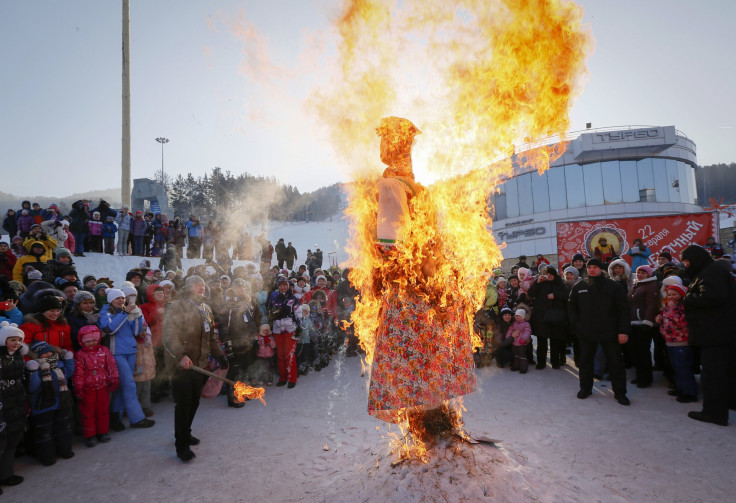Russians Burn Obama Effigy For Lent Celebrations While Ukrainians Burn Putin Effigy [Video]

Russian and Ukrainian Orthodox Catholics traditionally mark the week known as Maslenitsa leading up to what they call Great Lent by burning an effigy of a “Lady Maslenitsa.” But some towns updated their traditions to mark the ongoing conflict between Ukraine and Russia by burning effigies this year of U.S. President Barack Obama and Russian President Vladimir Putin instead.
Residents in Sevastopol, Crimea – the region Russia annexed from Ukraine last year – burned an effigy of Obama with the word “devil” scrawled across its forehead and the faces of Obama’s “puppets” dangling from the effigy’s hands, according to news site Vocativ. The faces depict several pro-Ukrainian political leaders.
In Kaliningrad, a Russian exclave, residents marked the end of Maslenitsa by burning a straw Obama effigy dressed in a black suit. The organizers of the event were quoted as saying the burning was intended to attract more viewers to the spectacle, according local news site Klops.ru. An Obama-effigy-burning was canceled in the Altai region after local media objected, according to the Moscow Times.
Meanwhile in Sumy, a city in Ukraine’s north, local radio stations have described Putin as “Ukraine’s No. 1 enemy” and celebrated the end of Maslenitsa by setting a Putin effigy alight. The figure was decorated with Russia’s symbols of military honor and donned a pig snout over the face. The festivities also doubled up as a protest as demonstrations were underway in other Ukrainian cities to mark the first anniversary of the ousting of former Ukrainian President Viktor Yanukovych, who had tried to urge Ukraine away from Europe and toward closer ties with Russia. Yanukovych is now wanted by Interpol for embezzlement charges, and he was known to have fled into Russia in February last year.
Maslenitsa is the week leading up to what Eastern Orthodox Catholics call Great Lent, similar to Lent in Western Christianity. Celebrated both in Ukraine and Russia, it falls on the eighth week before Easter, and also marks the end of winter. Believers give up meat during this time, and it is the last week dairy products are permitted, after which meat, fish, dairy products and eggs are given up for Great Lent. Revelers traditionally celebrate the end of Maslenitsa by burning an effigy of a Lady Maslenitsa, whereby its ashes are buried in the snow for good harvest in the coming spring.
© Copyright IBTimes 2024. All rights reserved.











